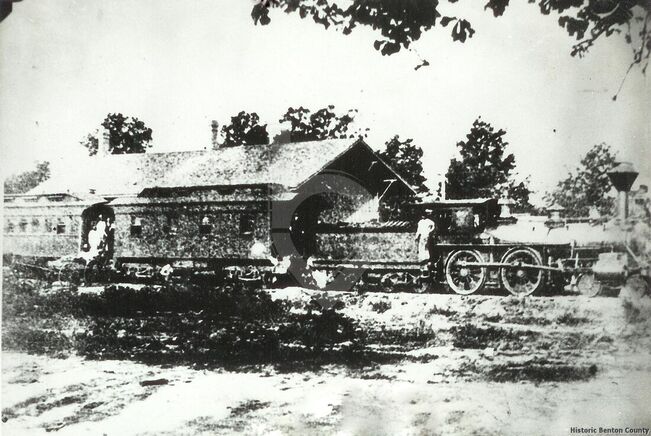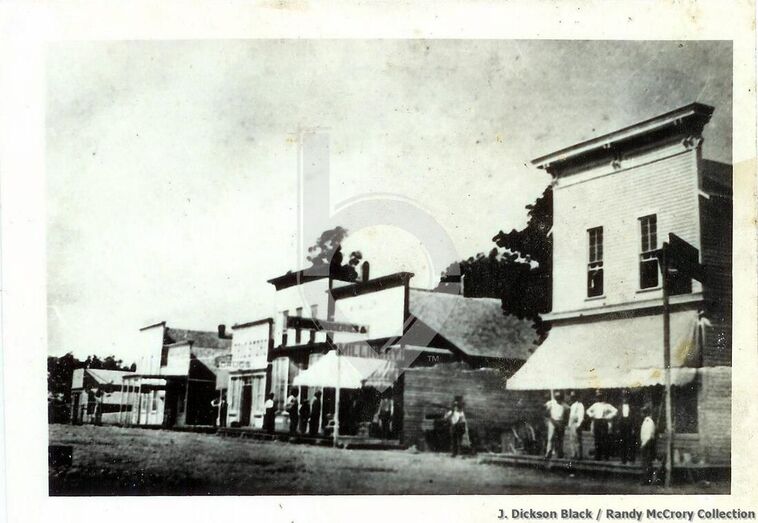The Coming Of The Frisco
by J. Dickson Black
by J. Dickson Black
When the Frisco Railroad Co. built their line across Arkansas from Gateway to Fort Smith, several new towns were started along the line. Most of these have all but faded out.
In the first months they all had a fast growth. Then they leveled out for years before they started down hill. There is just one that grew fast and is still growing. That is Rogers. When the Frisco line was surveyed through Benton County it crossed a farm owned by B. F. Sikes. A few months later the town of Rogers was laid out.
In the first months they all had a fast growth. Then they leveled out for years before they started down hill. There is just one that grew fast and is still growing. That is Rogers. When the Frisco line was surveyed through Benton County it crossed a farm owned by B. F. Sikes. A few months later the town of Rogers was laid out.
This image is believed to be the first train to arrive in Rogers
An article in the Fayetteville Democrat, May 18th, 1882 ,shows how fast Rogers grew. It is telling of the first anniversary of Rogers:
Wednesday last week was a great day for the wide awake and enterprising city of Rogers, Benton County, being the first
anniversary of the city's existence, now, but one year old, boasts a population of nearly 1300 souls.
The day was lovely and thousands of people availed themselves of the opportunity of visiting the magic city. At about 9 o'clock the
excursion train from Fayetteville arrived with more than three hundred people aboard. An hour later a special train arrived with
several hundred people from Springfield, Peirce City, Seligman, and other points.
At 11 o'clock a procession was formed on Arkansas Avenue headed by the Springfield cornet band, and marched to a beautiful
grove near by where stands and seats had been prepared, and where most of the exercises of the day were held. The Bentonville
and A.I.U. bands were also in attendance and contributed largely toward the enjoyment of the day.
Col. Hinman, editor of the Rogers Champion, gracefully performed the duties of master of ceremonies. Mayor Allen of that city was
first introduced to deliver the historical address, but but owing to illness was unable to do so. The address he had prepared was
read in a clear and eloquent manner by Col. E. C. Boudinot.
Next came the toasts and responses, First was, "Benton County and its products," which was responded to by Hon. Joshua
Huffman. "Arkansas" was eloquently responded to by W. C. Roberts. Esq. formerly of this city. "Rogers and its future" by John A.
Pirtle. Addresses were also made by John W, Brite, Rev. A Hayden, Judge Greenwood, and others. The exercises were interspersed
with music from the three bands present.
Dinner was served on the grounds after which the line of march was taken up to the famous Electric Springs, about a half mile
distant, where an hour or two was spent.
Wednesday last week was a great day for the wide awake and enterprising city of Rogers, Benton County, being the first
anniversary of the city's existence, now, but one year old, boasts a population of nearly 1300 souls.
The day was lovely and thousands of people availed themselves of the opportunity of visiting the magic city. At about 9 o'clock the
excursion train from Fayetteville arrived with more than three hundred people aboard. An hour later a special train arrived with
several hundred people from Springfield, Peirce City, Seligman, and other points.
At 11 o'clock a procession was formed on Arkansas Avenue headed by the Springfield cornet band, and marched to a beautiful
grove near by where stands and seats had been prepared, and where most of the exercises of the day were held. The Bentonville
and A.I.U. bands were also in attendance and contributed largely toward the enjoyment of the day.
Col. Hinman, editor of the Rogers Champion, gracefully performed the duties of master of ceremonies. Mayor Allen of that city was
first introduced to deliver the historical address, but but owing to illness was unable to do so. The address he had prepared was
read in a clear and eloquent manner by Col. E. C. Boudinot.
Next came the toasts and responses, First was, "Benton County and its products," which was responded to by Hon. Joshua
Huffman. "Arkansas" was eloquently responded to by W. C. Roberts. Esq. formerly of this city. "Rogers and its future" by John A.
Pirtle. Addresses were also made by John W, Brite, Rev. A Hayden, Judge Greenwood, and others. The exercises were interspersed
with music from the three bands present.
Dinner was served on the grounds after which the line of march was taken up to the famous Electric Springs, about a half mile
distant, where an hour or two was spent.
Early image of 1st. St. in downtown Rogers
The people returned to the city and began dispersing for home. A grand ball at Osbourne's Hall at night closed the exercises of the
great day in the history of Rogers.
The crowd in attendance was variously estimated at from 3,000 to 5,000 people.
The Fayetteville train arrived home about 8 o'clock. Not an accident occurred. and all felt that they had spent a delightful day.
The above article shows that Rogers had indeed had a good first year.
The first train pulled into the Rogers Station on May 10th, 1881. That is the date they use as their birthday. The town was named for Capt. C. W. Rogers, general manager of the Frisco Railroad. He was a New England man who did more to help this southern town than almost anyone else.
Rogers had a fast business growth the first year. The following is a list of business firms there in late 1881.
Dry goods and clothing, W. A. Miller and S.C. Bell; Clothing, C.C. Davis; Furniture, George Raupp; Restaurant, J. L. Merritt; General merchandise, J. W. Brite, Berryhill and Durham, J. Beasley, Mitchell and Dunnagin, and George Marshall.
Hardware, Pratt and Gibbs, J. H. Rackerby, C. T. Aid and Brother. Grocery, Stokes and Bowman, Scogin, Lowry and Robertson, and O.F. Beasley. Millery, Mrs. Alice Johnson. Meat market, J.F. Kelley, W.L. Pruiette and Company, George Marquette.
Lumber, Van Winkle and Blackburn, Redington and Chester, (C. H. Sheppard manager), Hardesty and Lunsford, a few miles east of Rogers.
Grain and Livestock, McCubbins and Peck, Hall, Huffman and Company, Huffman and Williams. Livery barn, H. L. and S. T. Stokes, and Kathon and Fant.
Saloons, John Cox, A. Greenstreet, and Captain Blue. Real estate, B. F. Sikes. Watchmaker, J. Watkins. Drugstore, John A. Pirtle, and Drs. Pennington and McNee.
Auctioneer, W. E. Trone. Barbershop, G. W. Hinkle. Commission house, Van Winkles
J. E. Applegate and his brother A. R. Applegate bought the Pennington and McNee drugstore on Dec 1st, 1881. A short time later A. R. sold to his brother J. E.
In running ads in the paper the stores all pointed out that they were either on the east or west side of the railroad tracks.
It is hard to say why Rogers of all the new towns along the Frisco grew so fast.
great day in the history of Rogers.
The crowd in attendance was variously estimated at from 3,000 to 5,000 people.
The Fayetteville train arrived home about 8 o'clock. Not an accident occurred. and all felt that they had spent a delightful day.
The above article shows that Rogers had indeed had a good first year.
The first train pulled into the Rogers Station on May 10th, 1881. That is the date they use as their birthday. The town was named for Capt. C. W. Rogers, general manager of the Frisco Railroad. He was a New England man who did more to help this southern town than almost anyone else.
Rogers had a fast business growth the first year. The following is a list of business firms there in late 1881.
Dry goods and clothing, W. A. Miller and S.C. Bell; Clothing, C.C. Davis; Furniture, George Raupp; Restaurant, J. L. Merritt; General merchandise, J. W. Brite, Berryhill and Durham, J. Beasley, Mitchell and Dunnagin, and George Marshall.
Hardware, Pratt and Gibbs, J. H. Rackerby, C. T. Aid and Brother. Grocery, Stokes and Bowman, Scogin, Lowry and Robertson, and O.F. Beasley. Millery, Mrs. Alice Johnson. Meat market, J.F. Kelley, W.L. Pruiette and Company, George Marquette.
Lumber, Van Winkle and Blackburn, Redington and Chester, (C. H. Sheppard manager), Hardesty and Lunsford, a few miles east of Rogers.
Grain and Livestock, McCubbins and Peck, Hall, Huffman and Company, Huffman and Williams. Livery barn, H. L. and S. T. Stokes, and Kathon and Fant.
Saloons, John Cox, A. Greenstreet, and Captain Blue. Real estate, B. F. Sikes. Watchmaker, J. Watkins. Drugstore, John A. Pirtle, and Drs. Pennington and McNee.
Auctioneer, W. E. Trone. Barbershop, G. W. Hinkle. Commission house, Van Winkles
J. E. Applegate and his brother A. R. Applegate bought the Pennington and McNee drugstore on Dec 1st, 1881. A short time later A. R. sold to his brother J. E.
In running ads in the paper the stores all pointed out that they were either on the east or west side of the railroad tracks.
It is hard to say why Rogers of all the new towns along the Frisco grew so fast.


